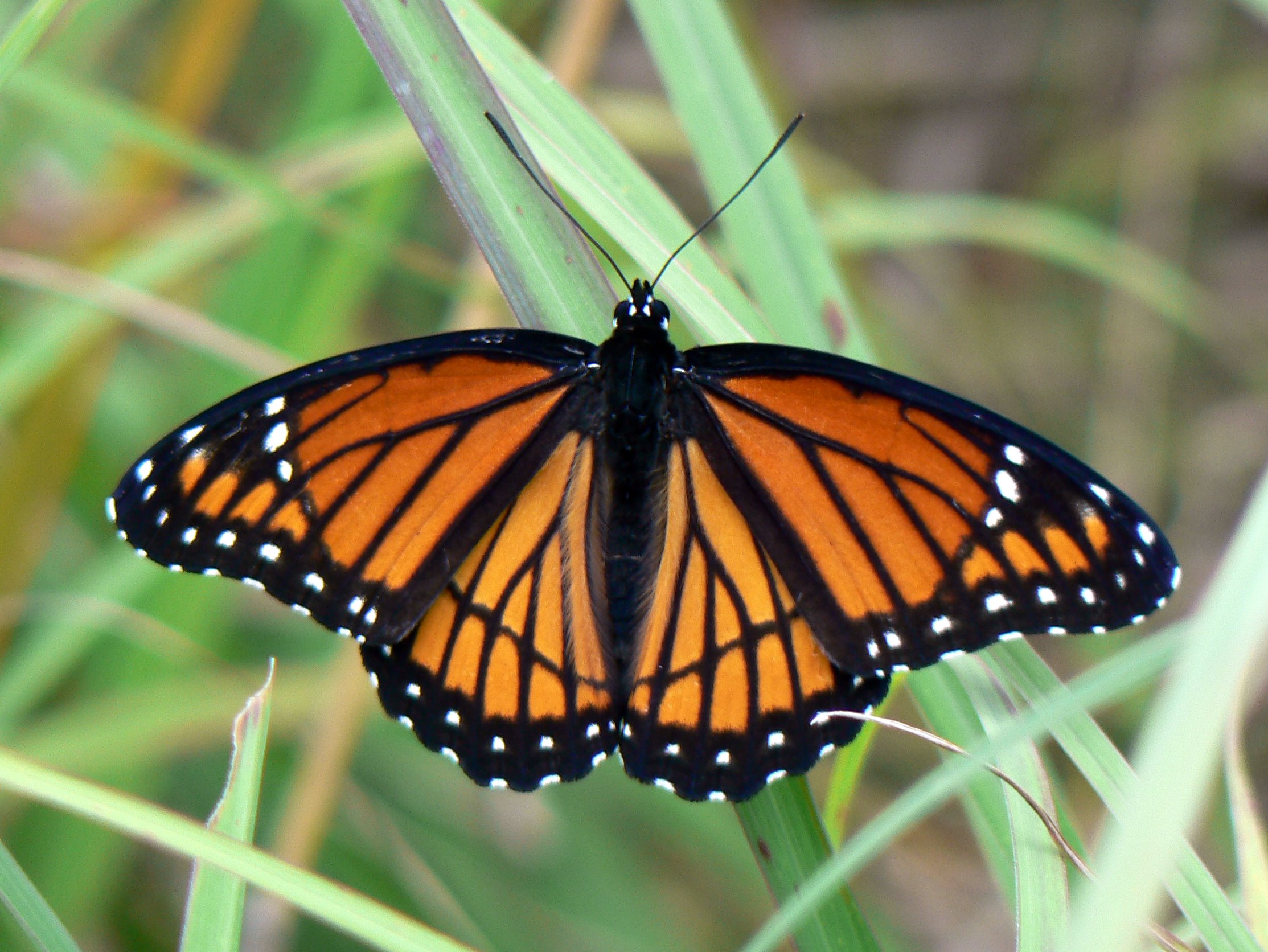The celebrated Russian-American novelist Vladimir Nabokov embodies the best of right and left brain thinking. Known for his great novels (Lolita, Pale Fire), he was also a passionate student of butterflies.

Viceroy Butterfly: A Mimic of the Monarch–can you tell the difference?
When he wasn’t producing world class literature, Nabokov served as a research fellow in entomology at Harvard while also teaching comparative literature at Wellesley. Nabokov published in such scientific journals as The Entomologist, The Bulletin of the Museum of Comparative Zoology, The Lepidopterists’ News, and Psyche: A Journal of Entomology.
According to an article published by the Discovery Institute, a conservative think tank, Nabokov was so vexed by the notion of mimicry in nature–moths and caterpillars in particular–that he rejected Darwinism. Mimicry is the scientific rationale for creatures imitating a model to benefit from the model’s unique traits.
For example, the Viceroy butterfly pictured above is considered a mimic of the Monarch, and benefits from the Monarch’s reputation as an untasty morsel to predators by appearing to be a Monarch. Yet Viceroy butterflies don’t eat milkweed whose latex toxins make it unsavory to birds and others. Viceroys host mostly on willows and poplars.
In human beings, mimicry might be compared to those who dress like fashion models with the hope of benefiting from their borrowed beauty. But with butterflies and other insects–how do they do it? Sheer force of will? Adaptation over time? Most scientists say mimicry results from evolution.
Nabokov, extremely learned on the topic, seems seriously unsatisfied by evolution as an explanation for mimicry. In his memoir, Speak, Memory, he foreshadows today’s discussions on intelligent design:
When a certain moth resembles a certain wasp in shape and color, it also walks and moves its antennae in a waspish, unmothlike manner. When a butterfly has to look like a leaf, not only are all the details of a leaf beautifully rendered but markings mimicking grub-bored holes are generously thrown in. “Natural Selection,” in the Darwinian sense, could not explain the miraculous coincidence of imitative aspect and imitative behavior, nor could one appeal to the theory of “the struggle for life….”
That a great mind like Nabokov’s doubted Darwin and challenged evolution makes us take pause. Surely it’s a testament to the infinite intrigue of butterflies.

Unfortunately, the Discovery Institute does not practice what the rest of the world deems science. Please use an article with less bias and more content the next time you’d like to discuss someone like Nabokov. He would never support such incredible nonsense.
Hi Emily,
I agree the Discovery Institute is not exactly scientific, yet the Nabokov quote taken from his book does speak to a bit of butterfly magic. I can relate to that. Many of us fully embrace evolution yet marvel at nature’s majesty, and in the case of mimicry it seems often inexplicable. Have never had my scientific friends really explain it to me in a way that I can understand. Thanks for writing.
Two things make Nabokov’s statement scientifically impossible to swallow, but good writing. 1. “all the details of a leaf” – Take a handlens and look at ALL the details of a leaf, the butterflies dont get close to that. Instead they have superficial (at best) similarity. 2. Nothing can define “the miraculous coincidence of imitative aspect and imitative behavior” because its a subjective idea. Therefore, he overestimates the task subjectively.
Scientifically, he underestimates the amazing biology of butterflies. Visual mimicry is less common than chemical/odor mimicry and there are many other forms of mimicry. The butterflies and most insects employ many tactics simultaneously. All of these colors and chemicals are the results of gene products and the influence of the environment on them. So, we can easily show that the biggest mechanism driving mimicry is the evolution of genes and resulting characters (phenotypes); if you look dangerous, you have an advantage. This explanation is sufficient for the vast majority of all mimicry examples and this is what trickles down to “non-scientists”.
There is plenty of content in the statement, just not much scientific content, we should not be biased to think everything has to be scientific.
[…] theories of our favorite self-taught butterfly expert, Vladimir Nabokov, were recently vindicated in academic papers released last week. Nabokov's […]
[…] ongoing popularity of the offbeat post, Butterflies Made a Darwin Doubter of Vladimir Nabokov, surprises. Perhaps referencing the conservative Discovery Institute is what continues to […]
[…] ongoing popularity of the offbeat post, Butterflies Made a Darwin Doubter of Vladimir Nabokov, surprises. Perhaps referencing the conservative Discovery Institute is what continues to […]
[…] Butterflies Made a Darwin Doubter of Vladimir Nabokov …Dec 8, 2010 … Did butterflies make Vladimir Nabokov a Darwin doubter? … Viceroy butterfly is considered a mimic of the Monarch–can you tell the difference? … […]
nabokov did not apparently recognize the concept of the Nash Equilibrium and the role it plays in evolutionary theory and how it explains quite well why there is biomimicry at all.